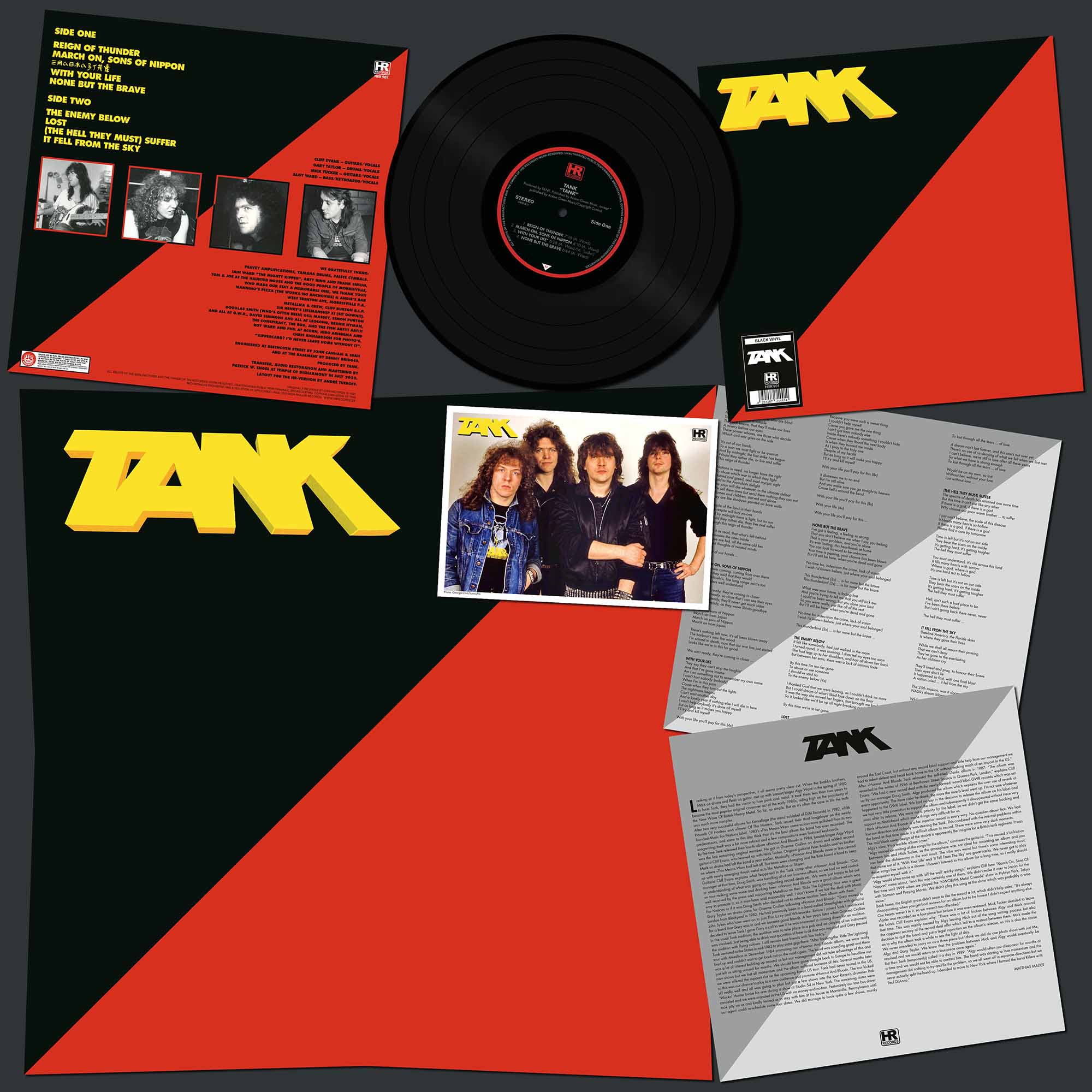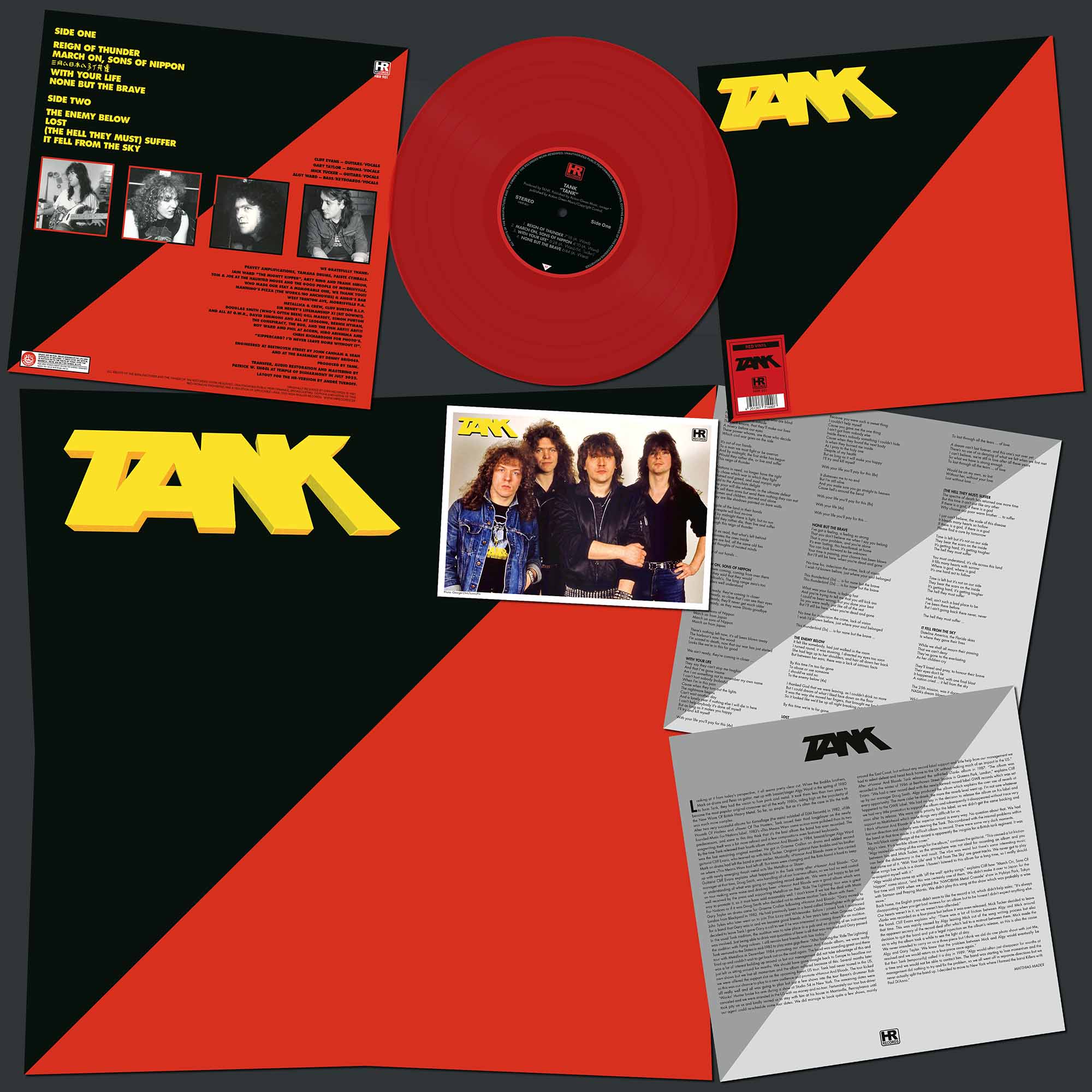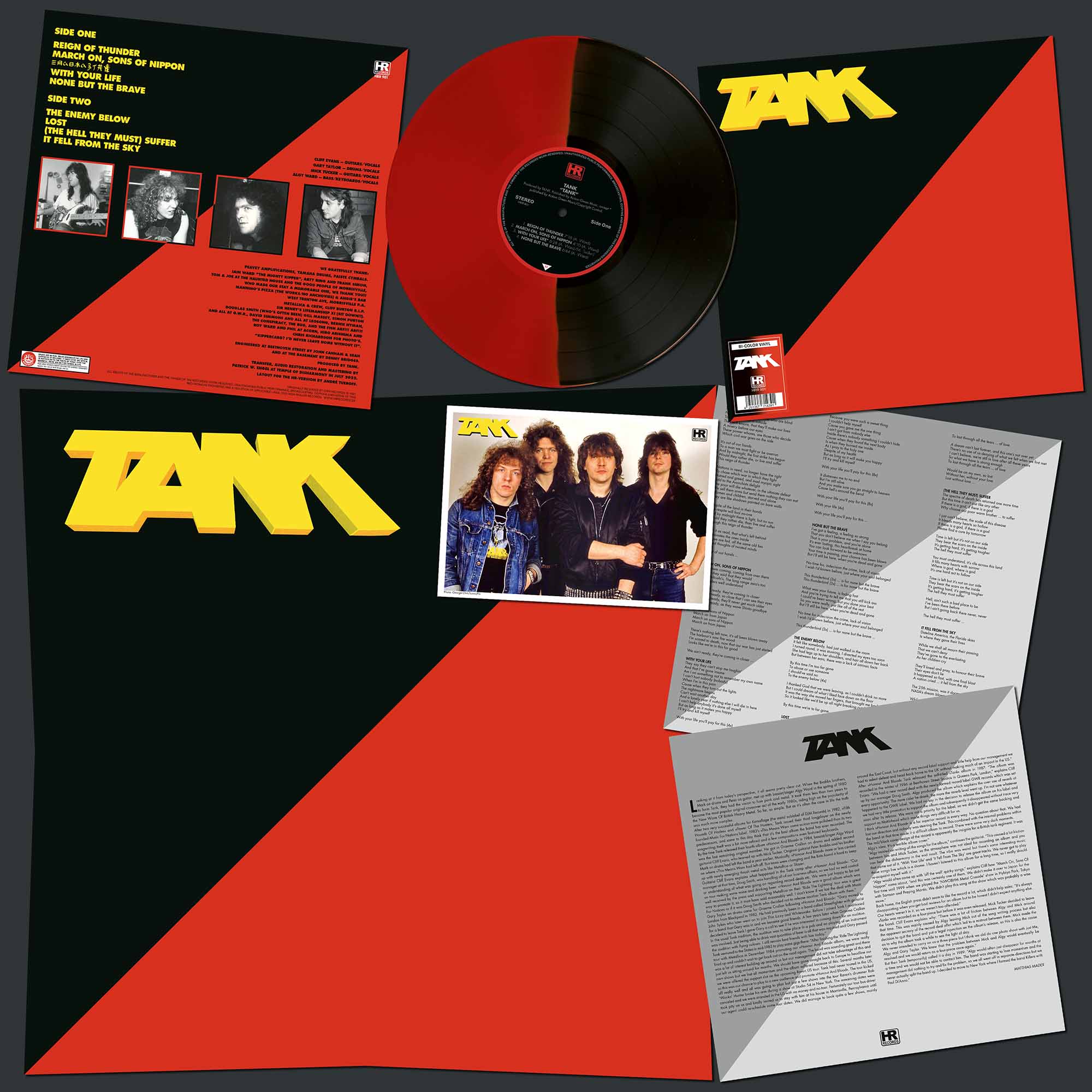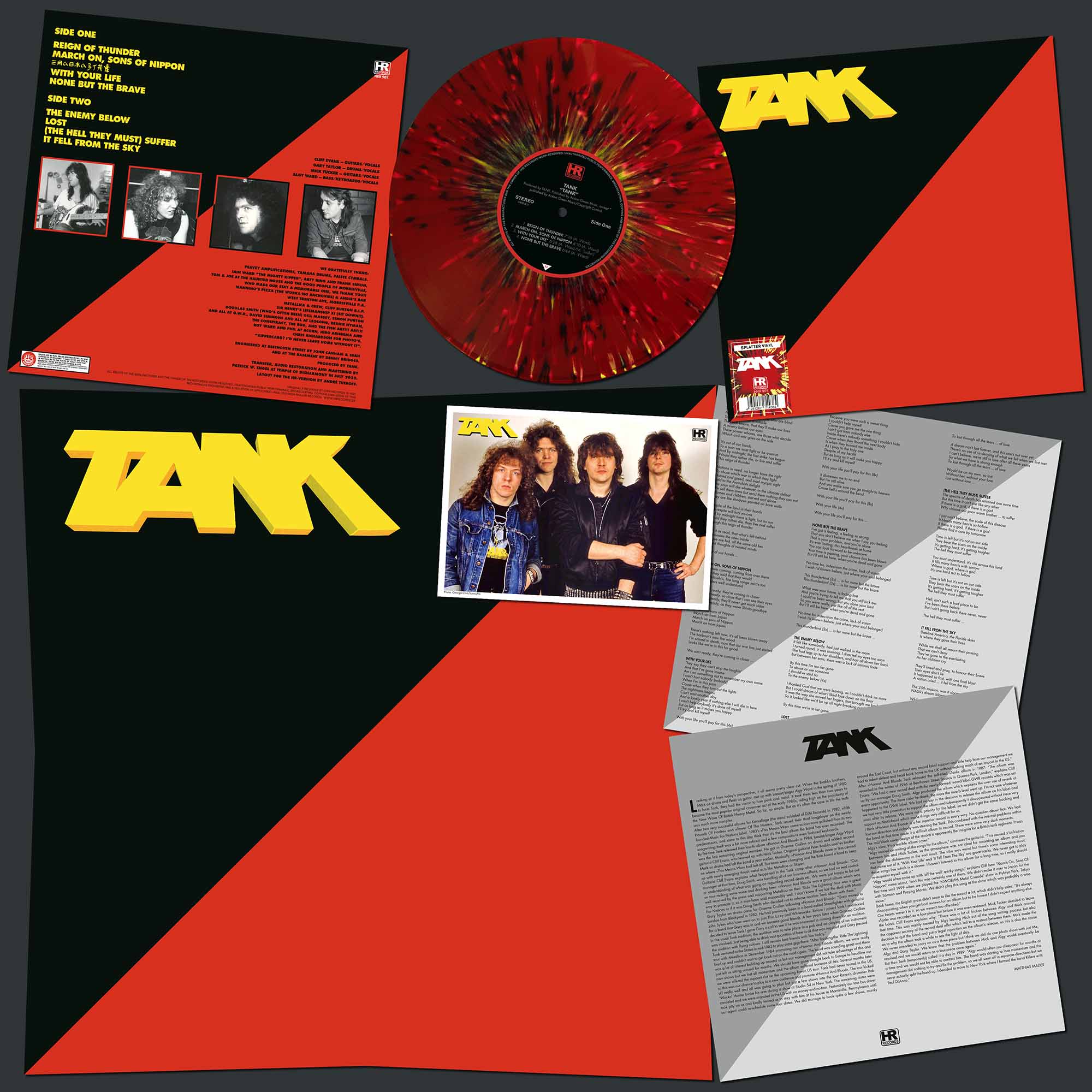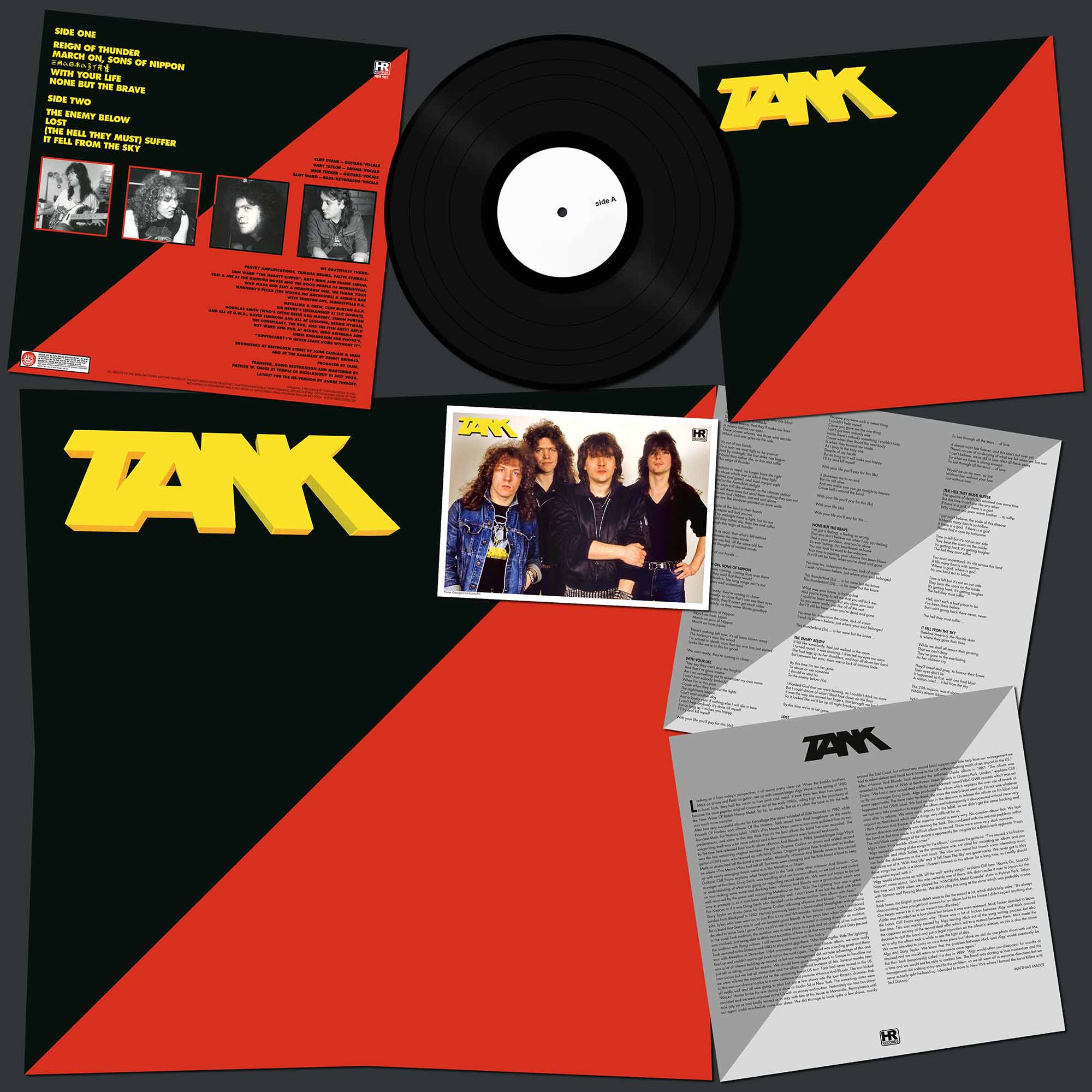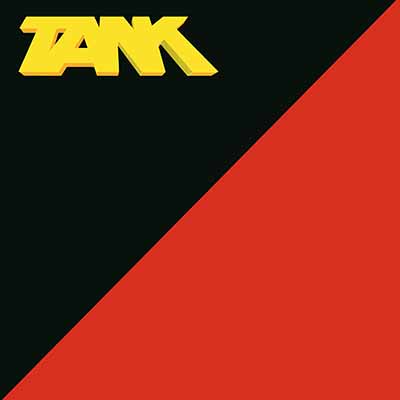 | ||||
| TANK - s/t LP | |
HRR 901LP, ltd 1500, 450 x black, 400 x red, 500 x red/ black bi-color + 150 x red w/ black & yellow splatter vinyl (HRR mailorder exclusive), 425gsm heavy cardboard cover, insert, poster, A5 photo card , | |
| Algy Ward - bass, keyboards, vocals Cliff Evans - guitars, vocals Mick Tucker - guitars, vocals Gary Taylor - drums, vocals | |
| 01 Reign of Thunder 02 March On, Sons of Nippon 03 With Your Life 04 None but the Brave 05 The Enemy Below 06 Lost 07 (The Hell They Must) Suffer 08 It Fell from the Sky | |
AVAILABLE | |
Transfer, audio restoration and mastering by Patrick W. Engel at TEMPLE OF DISHARMONY in July 2022.
Looking at it from today’s perspective, it all seems pretty clear cut. When the Brabbs brothers, Mark on drums and Peter on guitar, met up with bassist/singer Algy Ward in the spring of 1980 to form Tank, they had the vision to fuse punk and metal. It took them less than two years to become the most popular original crossover act of the early 1980s, riding high on the popularity of the New Wave Of British Heavy Metal. So far, so simple. But as it’s often the case in life the truth was much more complex.
After two very successful albums for Kamaflage (the metal sublabel of DJM Records) in 1982, »Filth Hounds Of Hades« and »Power Of The Hunter«, Tank issued their third longplayer on the newly founded Music For Nations label. 1983’s »This Means War« came across more polished than its two predecessors, and some to this day think that it’s the best album the band has ever recorded. The songwriting itself was a bit more refined and a few compositions even featured keyboards.
By the time Tank released their fourth album »Honour And Blood« in 1984, bassist/singer Algy Ward was the last remaining original member. He got in Graeme Crallan on drums and added second guitarist Cliff Evans, who teamed up with Mick Tucker. Original guitarist Peter Brabbs and his brother Mark on drums had left the band a year earlier. Musically, »Honour And Blood« more or less carried on where »This Means War« had left off. But times were changing and the Brits found it hard to keep up with newly emerging thrash metal acts like Metallica or Slayer.
Guitarist Cliff Evans explains what happened in the Tank camp after »Honour And Blood«: “Our manager at that time, Doug Smith, was handling all of our business affairs, so we had no real control or understanding of what was going on regarding record deals etc. We were just happy to be out on tour making some noise and drinking beer. »Honour And Blood« was a good album which was well received by the press and supporting Metallica on their ‘Ride The Lightning’ tour was a great way to promote it, so it must have sold reasonably well. I don’t know if we lost the deal with Music For Nations or if it was Doug Smith who decided not to release another Tank album with them.”
Gary Taylor on drums came for Graeme Crallan following »Honour And Blood«: “Gary moved to London from Blackpool in 1982. He had previously been in a band called Streetfighter with guitarist John Sykes who later went on to join Thin Lizzy and Whitesnake. Before I joined Tank I auditioned for a band that Gary was in and we became good friends. A few years later when Graeme Crallan decided to leave Tank I gave Gary a call to see if he was interested in coming down for an audition. In the usual Tank tradition, the audition was to take place in a pub and no playing of an instrument was involved. Just being able to drink vast quantities of beer is all that was required and Gary passed the audition with flying colours. I still remain best friends with him today.”
Tank ventured to the States in mid-1985 to play some gigs there: “After finishing the ‘Ride The Lightning’ tour with Metallica in December 1984 promoting our »Honour And Blood« album, we were really fired up and couldn’t wait to get back out on the road again. The band was sounding great and there was a lot of interest building up around us but our management did not take advantage of this and just left us sitting around for months. We should have gone straight back to Europe to headline our own shows but we lost all momentum and the album suffered because of this. Several months later we were offered the support slot on the upcoming Raven US tour. Tank had never toured in the US, so this was our chance to play to a new audience and promote »Honour And Blood«. The tour kicked off really well and all was going to plan but just a few shows into the tour Raven’s drummer Rob 'Wacko' Hunter broke his arm during a show at Studio 54 in New York. The remaining dates were canceled and we were stranded in the US with no money and no tour. Fortunately our tour bus driver took pity on us and kindly invited us to stay with him at his house in Morrisville, Pennsylvania until our agent could re-schedule some tour dates. We did manage to book quite a few shows, mainly around the East Coast, but without any record label support and little help from our management we had to admit defeat and head back home to the UK without making much of an impact in the US.”
After »Honour And Blood« Tank released the self-titled »Tank« album in 1987: “The album was recorded in the winter of 1986 at Beethoven Street Studios in Queens Park, London,” explains Cliff Evans. “We had a new record deal with the newly formed record label GWR records which was set up by our manager Doug Smith. Algy produced the album which explains the over use of reverb at every opportunity. The more cider he drank, the more the reverb level went up. I’m not sure whatever happened to the GWR label. We had no say in the decision to release the album on his label and we had very little promotion to support the album and subsequently it disappeared without trace very soon after its release. We were not a priority for the label, so we didn’t get the same backing and support as Motörhead which made things very difficult for us.
I think »Honour And Blood« is a far superior record in every way. No question about that. We had lost our direction and nobody was steering the Tank. This combined with the internal problems within the band at that time made it a difficult album to record. There were some very dark moments.
The red/black cover design of the record is apparently the insignia for a British tank regiment. It was Algy’s idea. It’s a terrible album cover.”
“Algy insisted on writing all the songs for the album,” continues the guitarist. “This caused a lot friction between him and Mick Tucker, so the atmosphere was not ideal for recording an album and you can hear the disharmony in the end result. The vibe was weird but there’s some interesting music that came out of it. ‘With Your Life’ and ‘It Fell From The Sky’ are great tracks. We never got to play those songs live which is a shame. I haven’t listened to this album for a long time, so I really should re-acquaint myself with it.”
“Algy would often come up with ‘off the wall’ quirky songs,” explains Cliff how “March On, Sons Of Nippon” came about, “and this was certainly one of them. We didn’t make it over to Japan for the first time until 1999 when we played the ‘NWOBHM Metal Crusade’ show in Hybiya Park, Tokyo with Samson and Praying Mantis. We didn’t play this song at the show which was probably a wise move.”
Back home, the English press didn’t seem to like the record a lot, which didn't help sales: “It’s always disappointing when you get bad reviews for an album but to be honest I didn’t expect anything else. Our hearts weren’t in it, so we weren’t too offended.”
»Tank« was recorded as a four-piece but before it was even released, Mick Tucker decided to leave the band. Cliff Evans explains why: “There was a lot of friction between Algy and Mick around that time. This was mainly caused by Algy leaving Mick out of the song writing process but also the apparent secrecy of the record deal offer which led to a mistrust between them. Mick made the decision to quit the band and put a legal injunction on the album’s release, so this is also the cause as to why the album took a while to see the light of day.
We never intended to carry on as a three-piece but I think we did do one photo shoot with just Me, Algy and Gary Taylor. We knew that the problem between Mick and Algy would eventually be resolved and we would return as a four-piece once again.”
But then Tank (temporarily) called it a day in 1989: “Algy would often just disappear for months at a time and we would not be able to contact him. The band was starting to lose momentum and the management did nothing to try and fix the problem, so we all went off in separate directions but we never actually split the band up. I decided to move to New York where I formed the band Killers with Paul Di’Anno.”
